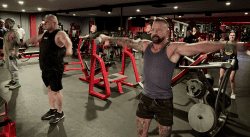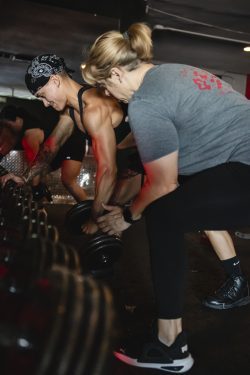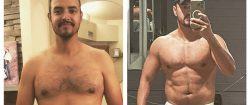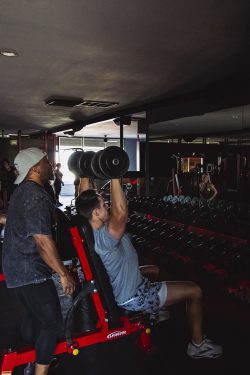Vegan Bodybuilding: Diet Guide and Meal Plan
Vegan and Bodybuilding, together? Yup!
Many bodybuilders believe that a vegan diet could not possibly provide them with enough protein and essential nutrients required for muscle growth and maintenance,. However, that is not true at all. A vegan bodybuilding diet can indeed provide enough protein, carbs, and healthy fats, all without the use of animal products. A nutritious vegan diet can be beneficial to your health, your performance, and the environment. In this guide, we will discuss everything you need to know about a vegan bodybuilding diet and provide you with a meal plan that will help you build muscle and stay healthy.
Start by Calculating Your Macros
Before you can figure out how to get 150 grams of protein, you’ll need to know what your protein needs actually are. A good rule of thumb is to aim for around 1 gram of protein per pound of body weight. So if you weigh 150 pounds, you should be getting around 150 grams of protein per day. Once you know your protein goal, you can start planning your meals accordingly.
Additionally, aim for 70 to 90 grams of essential fats per day. The remaining of your nutrients should be from carbohydrates. Follow these plan for three to four weeks, and then consider adjustments based on how you feel.
Protein
Protein is the macronutrient in your body that builds and repairs muscle tissue. It’s essential for digestion, metabolic function, supporting and building lean mass as well as general overall health.
Vegans have to consider getting enough “complete proteins.” A complete protein contains all the amino acids your body needs to help maintain your metabolism.
So, what makes a protein complete? A protein is considered ‘complete’ when it has nine essential amino acids in somewhat equal amounts. Our bodies naturally produce 13 amino acids, but the nine others need to be sourced elsewhere, i.e. from your food or supplementation.
When building muscle, protein is one of the most important nutrients you require. Although many animal products such as meat, dairy, and eggs are high in protein, vegans can get their protein from plant-based sources. Protein-rich vegan foods such as lentils, chickpeas, whole grains, nuts, and seeds can be easily incorporated into your meals. Soy, especially tofu and tempeh, is a great source of protein. Adequate protein intake along with resistance training will stimulate muscle growth.
Carbohydrates
To fuel intense workouts, you require carbohydrates, especially complex carbs that take longer to digest and provide sustained energy levels. They also help replenish glycogen stores, promote muscle growth, and aid in the recovery process. Whole-grain bread, brown rice, quinoa, sweet potatoes, and fruits and vegetables are all excellent sources of carbohydrates.
Fats
Fats are an essential macronutrient required for energy, hormone production, and brain function. It would be best to include healthy fats such as nuts, seeds, avocado, olive oil, and coconut oil to your diet, as they provide the necessary requirements of omega-3 and omega-6 fatty acids that cannot be produced by the body. Aim for healthy, unsaturated fats and limit your intake of saturated and trans fats, which can be harmful to your health.
Meal Planning
A vegan bodybuilding meal plan should include a variety of foods and nutrients to ensure you meet your daily requirements. Start by calculating your daily caloric needs and then divide them into smaller but more frequent meals. A meal consisting of 20% protein, 50% carbs, and 30% healthy fats is suitable for bodybuilding.
My recommendation is to eat small meals consistently through the day day to include protein with each meal.
In the bodybuilding community, we typically label our meals, meal 1, meal 2, etc. When you consider each eating as a meal, you will appreciate the importance of each meal.
Here is an example of a day’s worth of meals:
-Meal 1: Tofu scramble with veggies, avocado, and whole-grain toast.
-Meal 2: Oatmeal with berries, almond butter, and chia seeds.
-Meal 3: Chickpea and quinoa salad with mixed greens and a tahini dressing.
-Meal 4: Apple slices with almond butter.
-Meal 5: Lentil Bolognese over whole-grain pasta with a side salad.
-Meal 6 Bed: Soy yogurt with mixed berries and chia seeds.
Supplements
If you’re struggling to get all the protein you need from your diet alone, consider adding a protein supplement. There are plenty of vegan protein powders available on the market today, so finding one that works for you should be easy. Just make sure to read the ingredients carefully to avoid any animal products.
I typically do not promote brands, but in this instance I recommend Naked Pea Protein.
In conclusion, a vegan bodybuilding diet is a healthy, ethical, and sustainable option for all bodybuilders. It is essential to choose the right variety of plant-based foods and aim for a balance of all three macronutrients in every meal. With proper meal planning, vegans can ensure adequate protein, carbs, and fats, along with all the necessary micronutrients, to build and maintain muscle mass. Experiment with plant-based recipes and stay committed to your meals, and you will see tremendous results in your bodybuilding journey.
If you’re ready to take your fitness and your physique to the next level, it’s time for you to check out Physiques Gym! Our professional personal trainers have many years of experience. Our training is tailored specifically for each individual client’s needs. We provide more than just workout routines; we also offer advice on nutrition and healthy habits so our clients can reach their goals faster!
So what are you waiting for? Contact us today and get ready to transform your life with professional personal training at Physiques Gym!




